a rapture of distress
Now for some non-random, non-inexplicable poetry blogging. Today is W.B. Yeat's birthday.
Would I could cast a sail on the waterI first read Yeats in The Golden Treasury of Poetry, so I was still young enough that my primary interest in books was their illustrations (what's the point of a book, after all, that has no pictures or conversation?). I didn't know what the heck a "wandering Aengus" was, but I was instantly hooked on the imagery and elegance of his poetry. "I will find out where she has gone,/And kiss her lips and take her hands;/And walk among long dappled grass,/And pluck till time and times are done/The silver apples of the moon,/The golden apples of the sun." I was the kid who believed in fairies, even if she wasn't too sure about the existence of God or Jesus, who was positive she could get to Narnia if only she crawled through enough bushes and into enough cupboards. So I fell for his mythological poems first. When I was older I discovered his love poems and his political poems. His unrequited love for Maud Gonne is legendary of course. I saw a picture of her in the Dublin Writer's Museum, and I didn't think she was all that spectacular, but I guess she was the kind of person whose force of attraction was in their personality. The passion and despair of his love poems are almost Shakespearean in their intensity. If you're mooning over someone, Yeats feels your pain. Anyone who can say "Why should I blame her that she filled my days/With misery" is pretty far gone.
Where many a king has gone
And many a king's daughter,
And alight at the comely trees and the lawn,
The playing upon pipes and the dancing,
And learn that the best thing is
To change my loves while dancing
And pay but a kiss for a kiss.
I would find by the edge of that water
The collar-bone of a hare
Worn thin by the lapping of water,
And pierce it through with a gimlet, and stare
At the old bitter world where they marry in churches,
And laugh over the untroubled water
At all who marry in churches,
Through the white thin bone of a hare.
What I admire about Yeats, besides his genius with words, is his courage to write poetry in the midst of so much violence and suffering. He spends his life watching Ireland tear itself to pieces, and then the rest of Europe do the same, and in the face of so much public death and private misery he creates truly beautiful art. "Mad Ireland hurt you into poetry," Auden said in his elegy for Yeats. I like his versatility, from love poems, to fairies and Celtic mythology, to harsh politics. "But little time had they to pray/For whom the hangman's rope was spun,/And what, God help us, could they save?/Romantic Ireland's dead and gone,/It's with O'Leary in the grave." Not to mention The Second Coming, a poem I wish didn't still feel so ominous today: "but now I know/That twenty centuries of stony sleep/Were vexed to nightmare by a rocking cradle,/And what rough beast, its hour come round at last,/Slouches towards Bethlehem to be born?"
So I was pretty thrilled when we stopped at his grave in Sligo on my bus tour of Ireland.
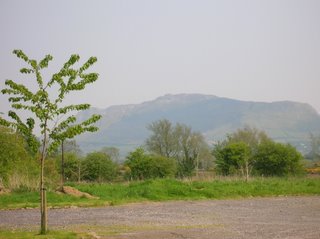 It's in a little country churchyard in the middle of nowhere, with the mountains all around, appropriately enough. As you walk up to the church there's a memorial to Yeats out in front, based on his poem "He Wishes for the Cloths of Heaven."
It's in a little country churchyard in the middle of nowhere, with the mountains all around, appropriately enough. As you walk up to the church there's a memorial to Yeats out in front, based on his poem "He Wishes for the Cloths of Heaven."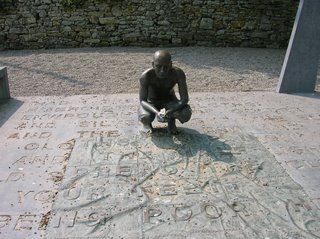 Frankly, I've never liked this poem. Too twee and maudlin. Tread softly because you tread on my dreams. Bleh. Lay off the sugar there, Will.
Frankly, I've never liked this poem. Too twee and maudlin. Tread softly because you tread on my dreams. Bleh. Lay off the sugar there, Will.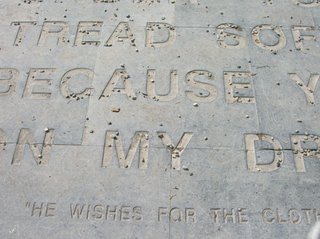 And I don't know why this Gollum dude is here. He's like a bald Hobbit in yoga pants. It's nice that he's holding a flower though.
And I don't know why this Gollum dude is here. He's like a bald Hobbit in yoga pants. It's nice that he's holding a flower though.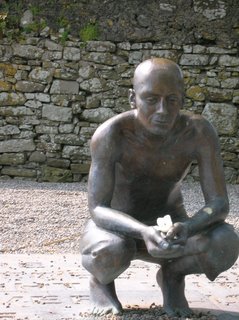 So if the memorial is overdone, at least the gravesite itself is quiet and almost ordinary.
So if the memorial is overdone, at least the gravesite itself is quiet and almost ordinary. The epitaph that he wrote for himself gave me chills. "Cast a cold Eye/On Life, on Death/Horseman pass by."
The epitaph that he wrote for himself gave me chills. "Cast a cold Eye/On Life, on Death/Horseman pass by." I was really, really frustrated though, because I was the only person on that tour who gave a good goddamn. I wanted to pay my respects to one of my favorite poets, on a gorgeous sunny day, and I'm surrounded by 30 Australians who probably slept through Freshman English and wouldn't know Yeats from Joe Blow. I think once a group of travelers reaches a critical mass, they develop a Tourist Pack Mentality where they start snapping pictures of things just because that's what you do when you're on vacation, and they were all standing around chatting and laughing and getting group photos in front of it and they don't even know who he is, and they don't care. And I'm the wierd dork because I'm actually moved by the place. I was really trying hard not to let them ruin it for me, but I was so pissed off. Even worse, there was a GIFT SHOP that sold mounds of Irishy Crap that had nothing do with Yeats. I could have spit nails I was so disgusted. I did manage to find some beautiful black and white photographs of Co. Sligo, including the Glencar waterfall (which is mentioned in "The Stolen Child") and I'm going to put them together in a frame with a copy of "The Lake Isle of Innisfree".
I was really, really frustrated though, because I was the only person on that tour who gave a good goddamn. I wanted to pay my respects to one of my favorite poets, on a gorgeous sunny day, and I'm surrounded by 30 Australians who probably slept through Freshman English and wouldn't know Yeats from Joe Blow. I think once a group of travelers reaches a critical mass, they develop a Tourist Pack Mentality where they start snapping pictures of things just because that's what you do when you're on vacation, and they were all standing around chatting and laughing and getting group photos in front of it and they don't even know who he is, and they don't care. And I'm the wierd dork because I'm actually moved by the place. I was really trying hard not to let them ruin it for me, but I was so pissed off. Even worse, there was a GIFT SHOP that sold mounds of Irishy Crap that had nothing do with Yeats. I could have spit nails I was so disgusted. I did manage to find some beautiful black and white photographs of Co. Sligo, including the Glencar waterfall (which is mentioned in "The Stolen Child") and I'm going to put them together in a frame with a copy of "The Lake Isle of Innisfree". This is the view from his grave. I really wish I had had some privacy and a copy of his work.
This is the view from his grave. I really wish I had had some privacy and a copy of his work.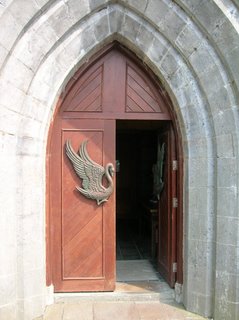 This is the door of the church next to his grave. I didn't have a chance to go inside, unfortunately, but that someone was thoughtful enough to use swans on the church doors cheered me up. And later on I did get to see wild swans at Coole.
This is the door of the church next to his grave. I didn't have a chance to go inside, unfortunately, but that someone was thoughtful enough to use swans on the church doors cheered me up. And later on I did get to see wild swans at Coole.So I had to take an irritating tourist bus to get there, but it was worth it. Not something I'm going to forget soon.
For poetry makes nothing happen: it survives
In the valley of its making where executives
Would never want to tamper, flows on south
From ranches of isolation and the busy griefs,
Raw towns that we believe and die in; it survives,
A way of happening, a mouth.
W.H. Auden, "In Memory of W.B. Yeats." (post title taken from this as well)


1 Comments:
yay for poems. thanks for this post.
Post a Comment
<< Home